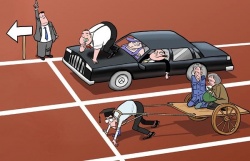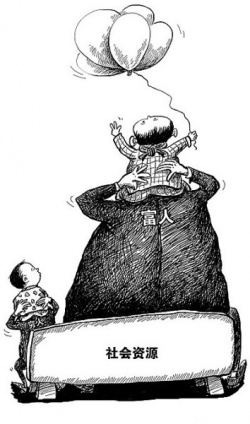“Second generation rich”的版本间的差异
来自China Digital Space
| 第5行: | 第5行: | ||
[[File:poor2.jpg|250px|right|thumb|''The larger figure labeled “rich person” holds his child aloft next to the much smaller “poor person.” Both figures sit on a bench labeled “social resources.”'']] | [[File:poor2.jpg|250px|right|thumb|''The larger figure labeled “rich person” holds his child aloft next to the much smaller “poor person.” Both figures sit on a bench labeled “social resources.”'']] | ||
| − | Before China's [http://en.wikipedia.org/wiki/Chinese_economic_reform “Reform and Opening”], Communism had substantially leveled the playing field, putting most people on more or less the same economic level. With Deng Xiaoping's free market reforms, the gap between rich and poor became more apparent. The children of those who prospered during the reform and opening up period are call the “rich second generation” and the children of those who did not prosper are called the “[[poor second generation]].” Commentators complain that institutional barriers (high cost of education, importance of connections, etc.) prevent the poor second generation from moving up. The [http://chinadigitaltimes.net/2013/03/bad-behavior-by-second-generation-rich-breeds-disdain/ bad behavior commonly displayed by some of these privileged youth have led to much disdain] in contemporary China. | + | Sons and daughters of China's newly rich. Before China's [http://en.wikipedia.org/wiki/Chinese_economic_reform “Reform and Opening”], Communism had substantially leveled the playing field, putting most people on more or less the same economic level. With Deng Xiaoping's free market reforms, the gap between rich and poor became more apparent. The children of those who prospered during the reform and opening up period are call the “rich second generation” and the children of those who did not prosper are called the “[[poor second generation]].” Commentators complain that institutional barriers (high cost of education, importance of connections, etc.) prevent the poor second generation from moving up. The [http://chinadigitaltimes.net/2013/03/bad-behavior-by-second-generation-rich-breeds-disdain/ bad behavior commonly displayed by some of these privileged youth have led to much disdain] in contemporary China. |
See also [[governing second generation]]. | See also [[governing second generation]]. | ||
2014年7月31日 (四) 21:53的版本
富二代 (fù èr dài): rich second generation
Sons and daughters of China's newly rich. Before China's “Reform and Opening”, Communism had substantially leveled the playing field, putting most people on more or less the same economic level. With Deng Xiaoping's free market reforms, the gap between rich and poor became more apparent. The children of those who prospered during the reform and opening up period are call the “rich second generation” and the children of those who did not prosper are called the “poor second generation.” Commentators complain that institutional barriers (high cost of education, importance of connections, etc.) prevent the poor second generation from moving up. The bad behavior commonly displayed by some of these privileged youth have led to much disdain in contemporary China.
See also governing second generation.
<feed url="feed://chinadigitaltimes.net/china/second-generation-rich/feed/" entries="5">
[{PERMALINK} {TITLE}]
{DATE}, by {AUTHOR}
</feed>






